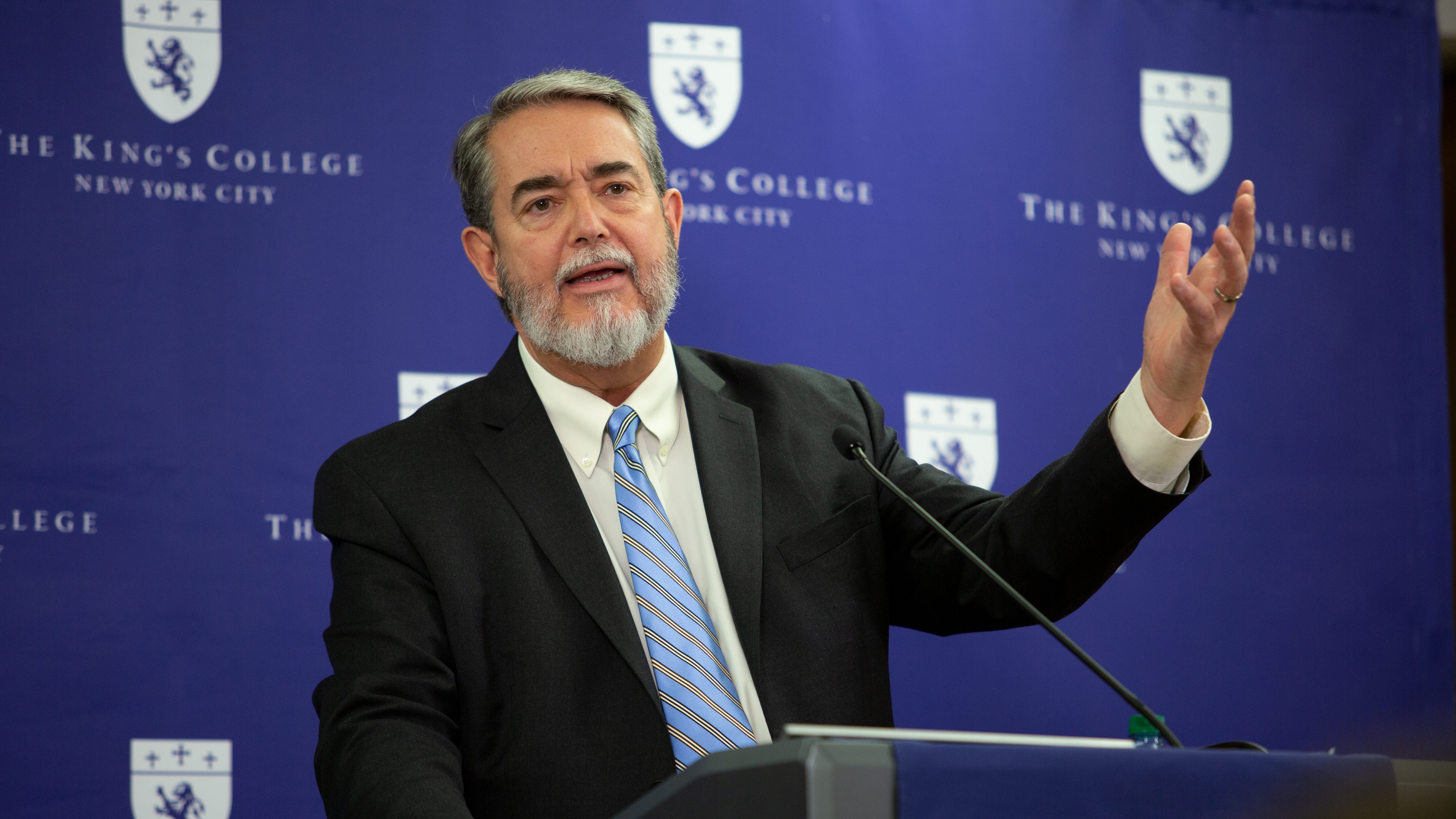Dr. Scott Hahn Advocates ‘Thick Ecumenism’ for Catholics and Protestants
On April 12, The King’s College hosted Dr. Scott Hahn for a lecture on “The Paschal Mystery: How did a Roman Execution Become THE Sacrifice?”.

Hahn has taught at Franciscan University of Steubenville since 1990, where he holds the Fr. Michael Scanlan Chair of Biblical Theology and the New Evangelization. Hahn is the bestselling author of over 40 titles, including The Lamb’s Supper and Reasons to Believe. Hahn’s answer to the title question of the lecture was that the Lord’s own words of institution transformed Christ’s death from an execution to a sacrifice, an answer he drew from his Catholic tradition and the writings of the early church fathers.
Hahn opened the lecture by recalling the story of Cleopas and his companion on the road to Emmaus, recorded in Luke 24. On numerous occasions after the Resurrection, Jesus revealed himself with a four-fold action: taking the bread, blessing it, breaking it, and giving it to them. It was through these actions that Cleopas and the other disciple with him recognized the risen Christ. “This is not a déjà vu for Cleopas and his companion, for they were not numbered among the twelve,” Hahn said. “This was instead a divine revelation, unveiling to them the mystery of the risen King of Kings. At any point he could have revealed himself to them, but it is precisely at this point, where he takes, he blesses, he breaks, he gives.”
This signature four-fold action traces back even earlier to Christ’s institution of the Lord’s Supper at the Passover table. The disciples would have understood his taking, blessing, breaking, and giving the bread not only as part of the Passover but as an association with animal sacrifice, which was always attended by a meal prepared from the consecrated offering. In Jesus’ words and actions, they would have recognized the language and gestures of substitutionary atonement. Even more, when Christ associated His own body with the atoning ritual through the words of institution, He not only announced Himself as the fulfillment of the Passover and gave the Church its central practice of remembrance, but He also initiated and called into being the atoning sacrifice that would follow the next day. “He was transforming the Passover of the old covenant into the passover of the new covenant,” Hahn said. Thus Holy Thursday, Hahn said, is when Christ laid down his life for the sacrifice completed at Calvary. But only the victory of Easter could transform the sacrifice into a sacrament for all time.
Hahn described a conversation he had with a friend who grew up Catholic but is now an evangelical. Over the course of six months, they called each other almost weekly to discuss Eucharistic theology. Within these phone calls, Hahn unfolded his belief that Christ’s sacrifice began in the upper room before His crucifixion. Hahn sees this conversation as an example of what healthy Protestant-Catholic relationships can look like. He urged the audience to practice a “thick ecumenism,” to be willing to take part in long, involved discussions to understand what we practice and believe as Christians.
Hahn argued that the New Testament was an action before it was a document—that early believers were told to enact the new testament (which he also calls the new covenant and the Eucharist) by partaking in the Lord’s Supper. Jesus’ direct command to His disciples in the upper room and to all who would believe in Him in the future was not “write in remembrance of Me” but instead “do this in remembrance of Me.” The written New Testament shows the historical record of first century believers going forth and living out this new covenant, or new testament, for each other and their neighbors.
Hahn challenged his audience to read Scripture in light of the Eucharist, which is how the New Testament was written. More broadly, recognizing that Protestant Christians differ from his Catholic theological convictions, Hahn defended the value of discussion within a context of friendship. “At this point in history, most especially, we have to forge the bonds of friendship, emphasizing the common ground,” Hahn said. “We then have to address our differences on the basis of that common ground and that fraternity we share, then lock arms and bear witness to a culture that is dying for a message of love like we have.”




